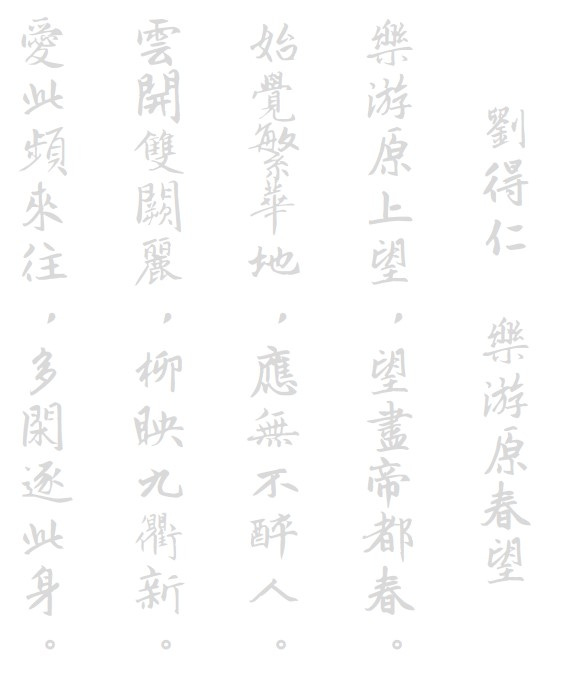A Vision of Spring from the Leyou Pleasure Gardens
Liu Deren
.
Spring is laid out in its entirety,
Viewing the emperor’s city from Leyou,
As if for the first time I truly know
Its majesty and its prosperity.
Now all the people must be drunk to see
When clouds part, bright palace towers show,
Broad avenues stay fresh with shady willow…
When I have more time, this is where I’ll be!
Till then my love drives me
To walk here frequently.
Liu Deren (mid 9th century) used the occasion of spring to produce a paean to the city of Chang’an.
The Leyou pleasure gardens was the Han Dynasty name for the park area to the southwest of the city. In Tang times it was often known as the River Qu pleasure lake, but for a Tang poet, it was natural to slip between modern names and the older Han names.
For the translation, I chose Wordsworth’s Lines Composed on Westminster Bridge as a model.
Earth has not any thing to show more fair:
Dull would he be of soul who could pass by
A sight so touching in its majesty:
This City now doth, like a garment, wear
The beauty of the morning; silent, bare,
Ships, towers, domes, theatres, and temples lie
Open unto the fields, and to the sky;
All bright and glittering in the smokeless air.
Never did sun more beautifully steep
In his first splendour, valley, rock, or hill;
Ne'er saw I, never felt, a calm so deep!
The river glideth at his own sweet will:
Dear God! the very houses seem asleep;
And all that mighty heart is lying still!
The poems share many features: They locate the viewer in a particular place, looking out at the city; they describe the glories of the city, particularly by enumerating some of its features; they draw in natural elements, and describe the city as being as beautiful as nature; they explicitly assert the universality of this beauty, that anyone who sees it must appreciate it.
The comparison flatters the older poem a little. I don’t think Liu is as creative in his choice of description; he isn’t kicking back at the romantic view of nature in the same innovative way as Wordsworth; and his meter is not used with the same precision or creativity. Liu is composing his poem as a safe and tame piece of praise for the powers that be: Chang’an is identified as the “emperor’s city,” and rather than Wordsworth’s modernity, Liu highlights continuity with history by using the Han Dynasty name for the gardens.
Still, the similarities are striking enough to justify a little borrowing of meter and word choices. Tang poets were engaged in an exploration of poetry no less dramatic, creative, turbulent, and contradictory than the English poets of modern and contemporary times. Allowing them to speak to each other is an interesting way to approach Tang poetry (of course, it is only one way among many).
刘得仁 乐游原春望
乐游原上望,望尽帝都春。
始觉繁华地,应无不醉人。
云开双阙丽,柳映九衢新。
爱此频来往,多闲逐此身。




